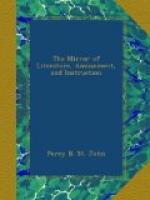Grace, the Duke’s second daughter, married Henry, first Earl of Darlington; and on the death of her brother William, second and last Duke of Cleveland, S.P., in 1774, her son, Henry, second Earl of Darlington, the father of the present Marquess of Cleveland, became one of the representatives of that family. It is an extraordinary fact, that the attainder of the celebrated Sir Henry Vane should never have been reversed, though his son was created a Baron, his great-grandson a Viscount and Earl, and his great-great-great-grandson a Marquess. The only individual on whom the title of Cleveland has been conferred, besides Barbara Villiers and her descendants, was Thomas, fourth Lord Wentworth, who was created Earl of Cleveland in February, 1626; but it became extinct on his death, S.P.M., in 1667.
Retrospective Review.
* * * * *
DIRTY PEOPLE.
A dirty dog is a nuisance not to be borne. But here the question arises,—who—what—is a dirty dog? Now there are men (no women) naturally—necessarily—dirty. They are not dirty by chance or accident—say twice or thrice per diem—but they are always dirty—at all times and in all places—and never and nowhere more disgustingly so than when figged out for going to church. It is in the skin—in the blood—in the flesh—and in the bone—that with such the disease of dirt more especially lies. We beg pardon, no less in the hair. Now such persons do not know that they are dirty—that they are unclean beasts. On the contrary, they often think themselves pinks of purity—incarnations of carnations—impersonations of moss-roses—the spiritual essences of lilies, “imparadised in form of that sweet flesh.” Now, were such persons to change their linen every half hour night and day, that is, were they to put on forty-eight clean shirts in the twenty-four hours,—and it would not be reasonable, perhaps, to demand more of them,—yet though we cheerfully grant that one and all of the shirts would be dirty, we as sulkily deny that at any given moment from sunrise to sunset, and over again, the wearer would be clean. He would be just every whit and bit as dirty as if he had known but one single shirt all his life—and firmly believed his to be the only shirt in the universe.
Men, again, on the other hand, there are—and, thank God, in great numbers—who are naturally so clean, that we defy you to make them bona fide dirty. You may as well drive down a duck into a dirty puddle, and expect lasting stains on its pretty plumage. Pope says the same thing of swans—that is, poets—when speaking of Aaron Hill diving into the ditch—




